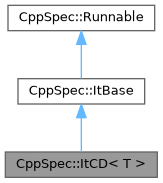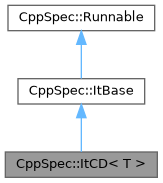Loading...
Searching...
No Matches
CppSpec::ItCD< T > Class Template Reference
An it embedded in a ClassDescription.
More...
#include <it.hpp>
Inheritance diagram for CppSpec::ItCD< T >:

Collaboration diagram for CppSpec::ItCD< T >:

Public Types | |
| using | Block = std::function<void(ItCD<T>&)> |
Public Member Functions | |
| ItCD (std::source_location location, T &subject, const char *description, Block block) | |
| ItCD (std::source_location location, T &subject, Block block) | |
| ExpectationValue< T > | is_expected (std::source_location location=std::source_location::current()) |
| void | run () override |
 Public Member Functions inherited from CppSpec::ItBase Public Member Functions inherited from CppSpec::ItBase | |
| ItBase (std::source_location location) noexcept | |
| Create an BaseIt without an explicit description. | |
| ItBase (std::source_location location, const char *description) noexcept | |
| Create an BaseIt with an explicit description. | |
| bool | needs_description () noexcept |
| Get whether the object needs a description string. | |
| std::string | get_description () const noexcept |
Get the description string for the it statement. | |
| ItBase & | set_description (std::string_view description) noexcept |
| Set the description string. | |
| template<Util::is_not_functional T> | |
| ExpectationValue< T > | expect (T value, std::source_location location=std::source_location::current()) |
The expect object generator for objects and LiteralTypes. | |
| template<Util::is_functional T> | |
| ExpectationFunc< T > | expect (T block, std::source_location location=std::source_location::current()) |
The expect object generator for lambdas. | |
| template<typename T> | |
| ExpectationValue< std::initializer_list< T > > | expect (std::initializer_list< T > init_list, std::source_location location=std::source_location::current()) |
The expect object generator for initializer lists. | |
| template<typename T> | |
| ExpectationValue< T > | expect (Let< T > &let, std::source_location location=std::source_location::current()) |
The expect object generator for Let. | |
| ExpectationValue< std::string > | expect (const char *string, std::source_location location=std::source_location::current()) |
The expect object generator for const char*. | |
| void | add_result (const Result &result) |
| std::list< Result > & | get_results () noexcept |
| const std::list< Result > & | get_results () const noexcept |
| void | clear_results () noexcept |
| Result | get_result () const override |
 Public Member Functions inherited from CppSpec::Runnable Public Member Functions inherited from CppSpec::Runnable | |
| Runnable (std::source_location location) | |
| bool | has_parent () noexcept |
| Check to see if the Runnable has a parent. | |
| bool | has_parent () const noexcept |
| Runnable * | get_parent () noexcept |
| Get the Runnable's parent. | |
| const Runnable * | get_parent () const noexcept |
| std::list< std::shared_ptr< Runnable > > & | get_children () noexcept |
| const std::list< std::shared_ptr< Runnable > > & | get_children () const noexcept |
| template<class C> | |
| C * | get_parent_as () noexcept |
| template<class C> | |
| const C * | get_parent_as () const noexcept |
| template<typename T, typename... Args> | |
| T * | make_child (Args &&... args) |
| std::string | padding () const noexcept |
| Generate padding (indentation) fore the current object. | |
| std::source_location | get_location () const noexcept |
| void | set_location (std::source_location location) noexcept |
| virtual void | timed_run () |
| std::chrono::duration< double > | get_runtime () const |
| std::chrono::time_point< std::chrono::system_clock > | get_start_time () const |
| size_t | num_tests () const noexcept |
| size_t | num_failures () const noexcept |
Public Attributes | |
| T & | subject |
| A reference to the parent ClassDescription's subject. | |
Detailed Description
template<typename T>
class CppSpec::ItCD< T >
class CppSpec::ItCD< T >
An it embedded in a ClassDescription.
ItCD objects are the representation of an it in a describe_a block. They contain both the function that represents the block of the it, and a reference to the parent ClassDescription::subject
- Template Parameters
-
T the type of the subject of the parent ClassDescription (ClassDescription<T>)
Member Function Documentation
◆ run()
template<class T>
|
overridevirtual |
Implements CppSpec::Runnable.
Member Data Documentation
◆ subject
template<typename T>
| T& CppSpec::ItCD< T >::subject |
A reference to the parent ClassDescription's subject.
Public so that we can easily do expect(subject) without needing to have a dedicated macro for accessing the subject via getter, or needing to introduce parenthesis for call syntax (like subject())
The documentation for this class was generated from the following files:
- include/it.hpp
- include/class_description.hpp